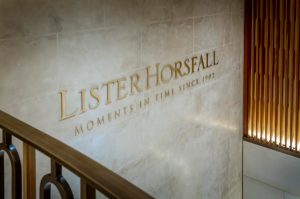City region’s ambition must be supported by commitment to fairer levelling up system
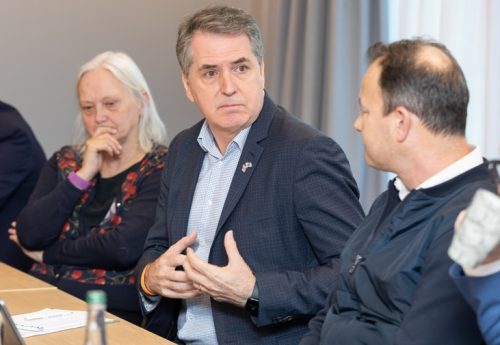
There is a sense of ambition in the Liverpool City Region over its massive potential in new industries and ground-breaking technologies.
A prestigious round-table of high profile business and public sector leaders spoke of their hopes for the region in the latest Invest North conference organised by TheBusinessDesk.com at the recently-opened Paddington Village Novotel in the heart of the city’s burgeoning Knowledge Quarter.
John Leake, business growth director at Sci-Tech Daresbury, said: “There’s a focus around the areas of strength within the city region, whether that’s around infectious diseases, around materials development. investments at Sci-Tech Daresbury, around high performance computing and AI and quantum computing.
“A number of things have been put into place, setting up Lyva Labs, the Seed Fund and the Angel Network, which are really important to getting those companies moving, but then actually seeing those companies grow and scale and making sure that they do that in the city region. I think we’ve now got the story and the opportunities for companies to do that.”
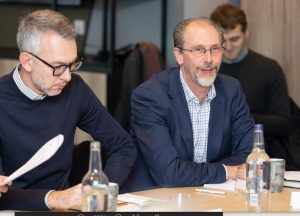
Andrew Ruffler, left, and John Leake
Investment is the keystone for developing new industries and technologies, and Tim Newns, managing director of the Government’s Office for Investment, said his main role is looking at how to win transformational investment for the regions.
He said: “Part of that is about working with some of the regions across the UK to take the internationally significant propositions that the likes of Liverpool has in scenarios like net zero and also life sciences, and take them further on the international stage.
“But also with some of the investors that are looking at the UK just making sure those propositions are really getting to them beyond just the Golden Triangle propositions in life sciences, for example. So we’re also working with some of the big capital funds globally, as well.”
He has struck a deal over the past 12 months with the likes of Abu Dhabi, creating a strategic investment partnership with Qatar. He said: “The Abu Dhabi fund is £10bn, of which £800m is life sciences-orientated. So, great opportunities for how we try and get some of that capital into the city region.”
Tom Sumptser is head of private markets with Phoenix Group which boasts 13 million customers, equivalent to £270bn-worth of pension funds. He said he works with Tim to find the right opportunities in regions like Liverpool to make vital investments.
“We spend a lot of time with Tim and the Department of Trade to understand how we can be crowded in to the various regions. We’re also a sponsor of this event, because we strongly believe that if we can hear where those pipeline of opportunities exist within the various regions, how we can form greater relationships that we and our industry can use the billions that we have available and put it to good use, as opposed to just finding that economic return – which of course is a big focus of ours and people’s pensions in the end – but do it with a social purpose.”
Prof Janet Hemingway, director of the iiCON Consortium, which brings together industry, academia and the NHS to accelerate products and innovations linked to infection control, said the region is now poised to play an even bigger world role in areas like life sciences. She said: “What I’ve seen over the 20 years I’ve been here now is we’ve moved from a fragmented sort of set up to now we’ve got a story, we’ve got a strategy, we actually need to deliver that strategy, but the bones are all there and everybody is getting behind it.
“And I think you’ve only got to look around the table here and see the group of people who pull together to see that that is something that we need to now deliver on. So we haven’t yet delivered, we’ve started to deliver, but there is a huge sort of big step that we should take.
“Sometimes people think too small and want to take baby steps. I think we’re now ready for some of those bigger steps. And we ought to be grabbing those, because if we don’t, then we’ll run out of momentum if we’re not careful. So I think there’s there’s opportunity here.”
Tom Le Quesne, special adviser with Lloyds Bank, pledged his support to help support transformational change for the region, saying: “We’re really keen to understand where we can partner further with others. We’re really up for challenging, stretching conversations to take that further.”
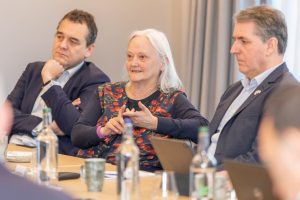
From left: Tom Le Quesne, Prof Janet Hemingway, Steve Rotheram
Neil Murray, chief executive of Impact Data Metrics, also heads a biotech and infectious disease company, and he stressed the importance of growth funding: “Getting seed capital is easy. It’s the next stage that enables companies to grow and prosper and develop into businesses that will employ hundreds of people, not the two or three or four or 10. And that’s the real challenge that we have.”
Alongside life sciences and tech, the region could also be poised to play an important role in the development of quantum computing, which utilises the fundamental principles of quantum mechanics to perform calculations.
Tim Newns said: “There are a number of companies globally, looking at quantum at the moment, a number of them looking at the UK and interested but not having quite worked out yet what the funding proposition is for that. So we’ve just really got to push to make sure that the infrastructure investment is going in, as well as these extra initiatives that will support levelling up properly, and commercial investment properly, so that propositions that are here can absolutely thrive.”
John Leake, from Sci-Tech Daresbury, added: “Tim’s right in terms of quantum computing – massive opportunities. There will be some exciting news coming forward on that next year.”
Colin Sinclair, CEO of Knowledge Quarter Liverpool, picked up on the links between forging new opportunities with the right funding: “Lloyds have a mandate for regional regeneration. If we tried to get anything that we do in Liverpool through a normal credit committee, it’s a bit tricky, but if Lloyds and others can take that regeneration role, we can be transformational.
“So those partnerships, public, private sector, university, are critical. For me taking risks, moving fast, you know, it’s a kind of Liverpool thing really that. Let’s take some risks. Let’s move really quick. Let’s be opportunistic, but as we do it, let’s gather evidence.”
Prof Hemingway threw down the gauntlet to the round table, saying: “I’m going to throw a challenge in to everybody, because nobody’s thinking small.
“So, we are globally leaders in infection control R&D. We do that in digital. We do that in the lab side. I think there is the opportunity to take that next big step and have something that is sitting around an infection R&D Super Cluster that has a nucleus, sitting here, but actually brings in a lot of the North West and the different bits we’ve got there.
“I think it needs some of the lab facilities. I think that lab facility needs robotics, and AI so we’ll do the sort of chemistry activities that you can’t do at the moment by sitting people in labs and doing them, and we’ve got the skill base from the university and the robotic system that’s there. And that links up with supercomputing and the AI, and we market the hell out of it as a consortium.
“We’ve actually got a base to be able to do that with iiCON, with the consulting partners, in terms of the NHS, academia, and industry already working together. We’ve demonstrated to central government we can make that work. So they gave me £18.6m – we’ve already turned it into £205m in two years and brought 500 companies to work with us.
“Build the hell out of it, and let’s get everybody around this table saying, how do we take that next big step?
“Because when I set this up two years ago, I said what it was meant to do was turn the dial, so rather than to spend £2bn on R&D for infection across the this bit of the North West we were going to go for £3bn. Well, I can do £3bn on what we’re doing at the moment, but I think if we all get together and move this, we can actually move that from being £2bn a year to actually £5bn a year much quicker.
“So this challenge, I’ll throw it out, but it needs all of the different components to really step up and have the confidence to take that next big step.”
Liverpool City Region Mayor, Steve Rotheram, responded, citing the opportunities to improve the ailing health sector which has been under such intense pressure since the pandemic. He said: “If we did it, as well on the health dimensions of this, just imagine what digital connectivity can do for health?
“The worst place you can go at the moment, and unfortunately I’ve been there, is A&E. Don’t get sick at the moment. It’s the wrong time for you to get sick and health, now, you can probably diagnose things better from home.
“So if you had the connectivity to homes, put your hands in a glove, or on a mat, or whatever, it would take all of those vital signs for you. And you don’t even need a GP because, all of those things, you can probably have an algorithm on AI that will tell you what it is that you need to do or what’s wrong with you.
“All that could happen as part of a real strategic health innovation in the city region. All of the different bits could come together.
“Government would be interested in that because it takes pressure off the NHS at the moment, using data in a different way so that we can predict some of these things and prevent it, and that will take the pressure off the NHS.”
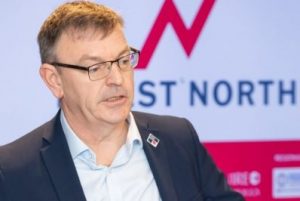
John Lucy
John Lucy, director of Liverpool Freeport, outlined how the newly-set up organisation could help support the kind of clusters that could give the region a world-leading role in new technologies. He said: “There’s a real opportunity in life sciences, and the way the Freeport model works is regeneration to create a cluster. So if you’re saying there’s a need for a cluster in the life sciences area, collectively, it’s just a case of putting the business case there. The Government really want to see these things come to the fore and we’ve got opportunities for funding.”
Andrew Ruffler, Professional Liverpool CEO, drew the panel’s attention to another area that Liverpool excels in, and can gain even more traction in, which is electronic gaming.
He met recently with a team from Sony who moved in to the city centre. It boasts a 450-strong headcount, which recently swelled by 350 following an acquisition. Mr Ruffler said: “You total those up and you start to realise that gaming, and Sony in particular, is probably one of the biggest private sector employers in the city.
“Yet nobody talks about it. It’s a massive, massive industry, it’s a phenomenal sector, but we don’t tell the story well enough. It’s an example of how these opportunities, these strengths, exist, and how we tell Tim (Newns), for instance, to get these messages out there – I think we need to get much much better.”
The North is full of investment opportunities and world-class economic strengths. Accelerating progress and unleashing its full potential can rebalance the national economy and change the lives of the people who live and work here.
Invest North is being led by TheBusinessDesk.com, in partnership with Northern Powerhouse Partnership, Squire Patton Boggs, Phoenix Group, and Lloyds Bank. It is also being supported by the Northern Powerhouse Investment Fund, Curveblock and Influential.
Through a series of round tables, research and interviews it will identify the investment opportunities and policy requirements that can make a significant difference to the economy of the North.
Visit investnorth.thebusinessdesk.com to find out more.



